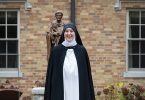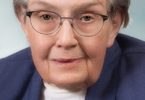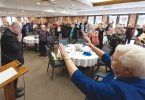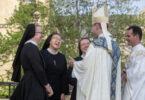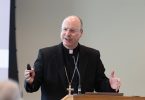
Deacon Dana Nearmyer (left) assists former Army chaplain and Iraq War veteran Father Peter Jaramillo, SSA, celebrating Mass on the hood of a truck from the Korean War. Photo by Jill Ragar Esfeld.
by Jill Ragar Esfeld
jill.esfeld@theleaven.org
WILLIAMSBURG — If you drive southbound on Interstate 35 past Prairie Star Ranch here, you’ll soon run into the Matfield Green rest area.
Though it is not known for much more than a gas station and a Dunkin’ Donuts, the rest area also has a historical marker that designates it as exactly 38 degrees north latitude — the 38th parallel.
Dr. Paul Camarata, producer of SaintCast, a weekly Internet podcast about saints and a parishioner of Church of Nativity Parish in Leawood, referred to that little-known fact when he spoke to campers and guests on Aug. 1 before a jeep Mass hosted by Camp Tekakwitha and Prairie Star Ranch.
Camarata hoped their proximity to the 38th parallel would bring home to his audience the reality of a war fought before most of them were born.
Click on the image to scroll through the gallery of photos
A circle of latitude on the Northern Hemisphere, Camarata told the group, the 38th parallel marked the boundary between North and South Korea after World War II.
On June 25, 1950, North Korea crossed that boundary and the 38th parallel has since been synonymous with the Korean War.
The marker at Matfield Green reads: “During the Korean Conflict, 415 Kansans died or were listed as missing.”
Among those who sacrificed their lives was Father Emil Kapaun, a Catholic chaplain from St. John Nepomucene Parish in Pilsen.
Camarata read from Father Kapaun’s Bronze Star citation awarded in August 1951, recounting how the chaplain ran through enemy fire to drag wounded soldiers to safety.
He told of how Father Kapaun was captured by Chinese Communists in November 1950 and spent the rest of his short life caring for the physical and spiritual needs of his fellow prisoners of war.
Father Kapaun died of malnutrition and pneumonia in the prison camp in May 1951.
He was posthumously awarded the Medal of Honor by President Obama and is also being considered by the Vatican for canonization (see sidebar).
Telling the audience that “here is the voice of a hero,” Camarata played the only known recording of Father Kapaun from a sermon delivered on Armed Forces Radio two months before he went to Korea.
In it, Father Kapaun talked about the peace that God gives which exists “even in times of suffering.”
“Father Kapaun is a saint for our times,” said Camarata.
Camarata’s speech introduced an outdoor Mass honoring this brave, self-sacrificing chaplain by recreating his practice of celebrating the Eucharist in an open field on the hood of a jeep.
“Our staff, parents and campers, and all our guests were so moved by the jeep Mass,” said Deacon Dana Nearmyer, camp director and archdiocesan consultant for the evangelization and Catholic formation of youth.
“The inspiring story of Father Kapaun as told by Doctor Camarata,” continued Nearmyer, “the singing of the Korean and U.S. national anthems, Lieutenant Colonel Kim’s speech, Father Peter’s powerful homily, Micheal Mette leading music, the playing of taps on bugle and the singing of the ‘Salve Regina,’ were frequently mentioned as highlights.”
But it wasn’t only campers and their families that comprised the congregation. Guests also included veterans, the Korean community, Korean military officials and Kapaun Guild leaders.
When Lt. Col. Kwansoo Kim, liaison officer from the Republic of South Korea, spoke before the Mass, he told the audience it was a “great honor” to be there and talk about Father Kapaun.
“Even in POW camp,” he said, “he showed kindness and generosity.”
Kim reflected on South Korea today, especially the great influence of the Catholic Church there.
“I think American solders’ and Father Kapaun’s sacrifice were not in vain,” he said.
The centerpiece of the Mass was a 1952 M-57 military truck used in the Korean War.
Former Army chaplain and Iraq War veteran Father Peter Jaramillo, now pastor at St. Mary-St. Anthony, St. John the Baptist, and Holy Family parishes in Kansas City, Kansas, celebrated the Mass on the hood of the truck.
Concelebrants were Father Jerry Spencer of Curé of Ars Parish in Leawood and Father Anthony Ouellette of All Saints Church in Kansas City, Kansas.
In his homily, Father Jaramillo said that, as a chaplain, he had celebrated Mass on jeep hoods and buses “hundreds of times.”
“I am privileged to celebrate this Mass with you,” he said.
Father Jaramillo talked about the difficult process of preparing for deployment, knowing that you may never see your family again.
“When one sees another laying down their life,” he said, “it is unforgettable.”
He also shared his own experiences ministering to soldiers in difficult situations with the knowledge that “the Lord had me there for a reason.”
“Kapaun is my hero and your hero,” he said. “He’s our hero imitating the life of Jesus Christ in his humble way.”
The jeep Mass ended with a moment of silence remembering Father Kapaun and all the soldiers who have sacrificed their lives for the good of others.
Father Emil Kapaun
If you’d like to learn more about Father Emil Kapaun, Dr. Paul Camarata recommended the book “The Miracle of Father Kapaun: Priest, Soldier, and Korean War Hero” by Roy Wenzl.
Check this website for more details about Father Kapaun’s life: http://catholicdioceseofwichita.org/father-kapaun.

